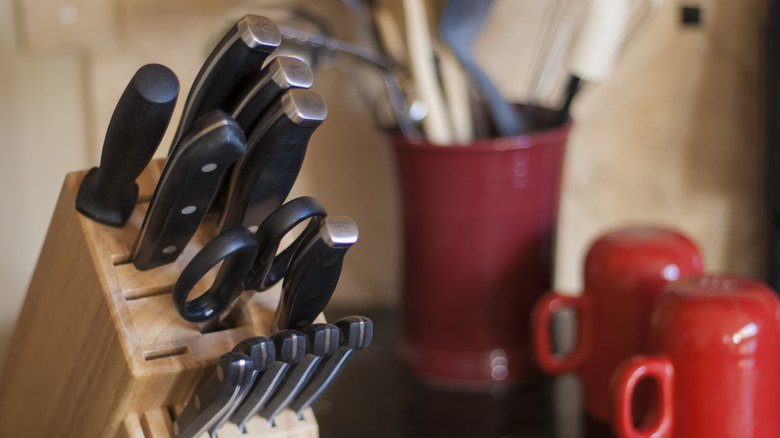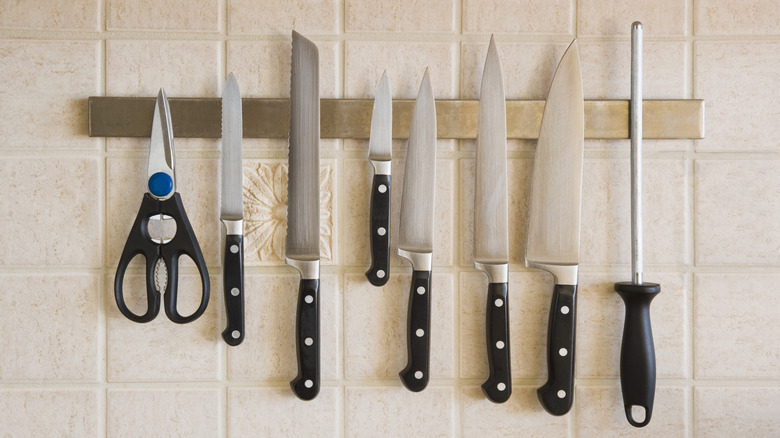The Gross Reason You Might Want To Avoid A Knife Block
When it comes to storing kitchen knives, many households opt for the classic wooden knife block. It's a familiar sight in kitchens across the world, providing a convenient and traditional way to keep your knives within reach. However, there's a dirty secret lurking within these wooden blocks that might make you reconsider your choice. Not only can wooden knife blocks dull your precious blades, but they can also become a breeding ground for yeast, mold, and other nasty germs.
In a household germ study conducted by NSF International, an independent testing group specializing in public health and safety, the innocent knife block ranked as the seventh most germ-contaminated item in the kitchen, trailing closely behind the infamous refrigerator meat compartment. Surprising, isn't it? But before you banish your knife block to the trash, let's delve into the reasons behind this alarming revelation and explore some alternative knife storage solutions.
A microbiologist and consumer product safety expert at NSF International, Lisa Yakas, sheds light on the issue. "Naturally, if you put a wet or dirty knife into a storage block, microbes may grow," she told Better Homes & Gardens. "Dark, moist environments breed germs. The key is washing and thoroughly drying your knife before you store it," she said. The list of kitchen-dwelling germs found in the study includes E. coli, Listeria, Salmonella, yeast, and mold. Cutting a steak with a germ-ridden knife from a wooden block doesn't sound like such a good idea anymore.
Dull knives, germs, and alternatives to the wooden knife block
The ultimate culprit behind the germ party inside your wooden knife block is moisture. When you use a knife, some moisture will inevitably remain on the blade. Whether the knife is dirty or freshly clean yet wet — if you slide that damp, contaminated knife into a slot in the block, you're creating a welcoming environment for microbes. Over time, they can multiply, leading to a potentially unsanitary situation.
But what about those knife slots that seem perfectly designed to accommodate each knife? Unfortunately, they can be the very thing that causes your knives to lose their edge. As you repeatedly insert and remove knives from these slots, the blade rubs against the wood, causing microscopic nicks and dulling the blade's sharpness. This will force you to sharpen your kitchen knives more often, which will only further dull and wear them down.
To prevent this unfortunate scenario, it's essential to explore alternative knife storage solutions that protect your knives and maintain a hygienic kitchen environment. All in all, the wooden knife block is not the greatest. One of the most popular alternatives is a magnetic knife rack. These can be easily mounted on the wall or inside a cabinet. They allow you to display your knives in a visually appealing way while keeping them dry and readily accessible. Plus, since the knives hang freely on the strip, there's no risk of dulling the blades.
From knife rolls to plastic edge guards
If you prefer to keep your knives out of sight, consider using knife drawer inserts. These organizers fit neatly inside your kitchen drawers and have designated slots for each knife. Bonus — less wasted counter space. For those who need a portable solution, knife rolls or bags are an excellent choice. These compact cases come with individual pockets for your knives and can be rolled up or zipped closed for easy transport.
Opting for plastic knife edge guards is a hygienic, cost-effective, and practical solution for storing knives in a drawer. These guards offer versatile protection for knives of all sizes, ensuring safe storage and easy transportation with concealed blades. If you appreciate the aesthetics of a knife block but want to avoid germy issues, magnetic knife blocks use magnets to securely hold your knives in place, keeping them dry and easily accessible. They also eliminate the risk of blade dulling associated with traditional knife blocks.
In addition to adopting a new storage method, implementing good knife hygiene practices is crucial. Always wash and thoroughly dry your knives before storing them, and avoid putting wet or dirty knives into storage. Regular cleaning and maintenance of your chosen storage solution will go a long way in ensuring both your knives' longevity and a healthier kitchen environment. It's time to bid farewell to the old wooden block and embrace a more sanitary and practical approach to knife storage. Knives out!


